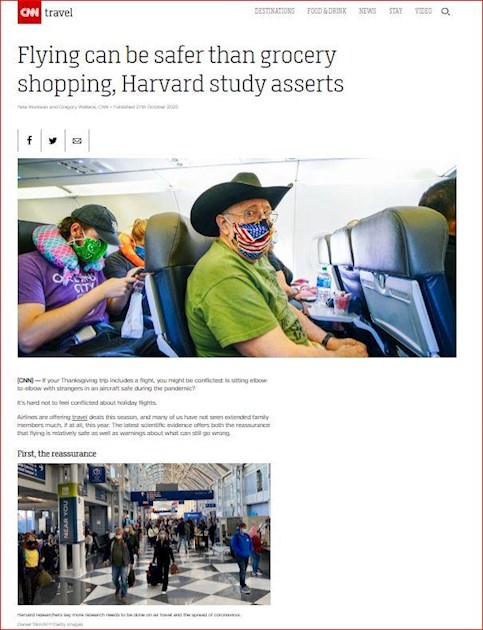Flying can be safer than grocery shopping, Harvard study asserts
cnn.com/travel/article/flyi...
Pete Muntean and Gregory Wallace, CNN • Published 27th October 2020
SAN DIEGO, CA - MAY 20: Passengers onboard an American Airlines flight to Charlotte, NC at San Diego International Airport on May 20, 2020 in San Diego, California. Air travel is down as estimated 94 percent due to the coronavirus (COVID-19) pandemic, causing U.S. airlines to take a major financial hit with losses of $350 million to $400 million a day and nearly half of major carriers airplanes are sitting idle. (Photo by Sandy Huffaker/Getty Images)
(CNN) — If your Thanksgiving trip includes a flight, you might be conflicted: Is sitting elbow-to-elbow with strangers in an aircraft safe during the pandemic?
It's hard not to feel conflicted about holiday flights.
Airlines are offering travel deals this season, and many of us have not seen extended family members much, if at all, this year. The latest scientific evidence offers both the reassurance that flying is relatively safe as well as warnings about what can still go wrong.
First, the reassurance
Harvard researchers say more research needs to be done on air travel and the spread of coronavirus.
A Harvard University study released Tuesday used computer models to review airflow in airliner cabins, and it says the specialized onboard ventilation systems filter out 99% of airborne viruses. It was funded by airlines, airplane manufacturers and airports, but the Harvard researchers insist this did not impact their findings.
Researchers at the university's T.H. Chan School of Public Health found that even though air is recirculated back into the cabin, it goes through high-quality filters first. And virus droplets from one passenger are unlikely to infect another because of a "downward direction" of airflow, they said.
"This ventilation effectively counters the proximity travelers are subject to during flights," their report says.
The ventilation system, however, is not effective alone. Harvard's researchers described masks as a critical part of keeping travelers healthy and credited the role of disinfection and passengers' self-screening for Covid-19 symptoms.
Modern aircraft ventilation systems aren't spreading viruses, DoD study suggests
The "layered approach, with ventilation gate-to-gate, reduces the risk of SARS-CoV-2 transmission onboard aircraft below that of other routine activities during the pandemic, such as grocery shopping or eating out," the study said.
The Harvard computer modeling was in line with another recent study by the Defense Department that used mannequins outfitted with surgical masks and particle detection equipment on Boeing 767 and 777 jets. It found little risk of transmission thanks to the masks and efficient air ventilation.
Harvard researchers described wearing masks as a critical part of keeping travelers safe in aircraft cabins, but stopped short of calling for a government mask mandate onboard flights.
Harvard researchers described wearing masks as a critical part of keeping travelers safe in aircraft cabins, but stopped short of calling for a government mask mandate onboard flights.
What can go wrong
On the other hand, a study released by Irish researchers shows what can go wrong onboard, even when precautions are taken.
Through contract tracing, public health officials in Dublin and other cities linked 13 cases to a single passenger on a seven-hour international flight this summer. Fewer than one in five seats were filled. None of the travelers were known to not wear a mask on the flight.
So how did that spread?
"Exposure possibilities for flight cases include inflight, during overnight transfer/pre-flight or unknown acquisition before the flight," the researchers wrote. One traveler could have picked up the virus from a family member. Two others spent multi-hour layovers in airport lounges.
But for others, "in-flight transmission was the only common exposure," they concluded, noting that "four of the flight cases were not seated next to any other positive case, had no contact in the transit lounge, wore face masks in-flight and would not be deemed close contacts."
The odds of catching Covid-19 on an airplane are slimmer than you think, scientists say
Laboratories linked the cases as being from the same strain.
The Irish researchers recommended authorities improve contact tracing, and Harvard's scientists encouraged people to minimize mask removal -- such as when eating or drinking -- in flight.
Harvard's researchers are already turning their attention to other parts of the travel experience when people congregate without the aircraft ventilation system, such as in airport lounges and security lines.
